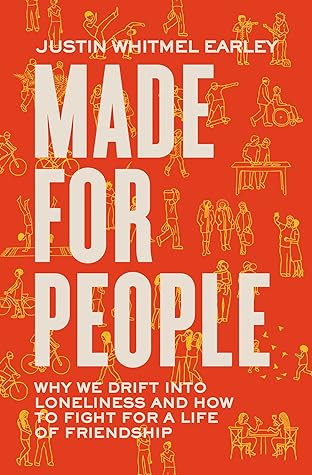More on this book
Community
Kindle Notes & Highlights
Read between
February 26 - February 26, 2025
What we usually don’t realize is that all that fear and anxiety is not the product of facing difficult circumstances, it is the product of facing those circumstances alone.
Which is why finding others who were interested meant so much to me—I thought I was the only one!
The “You too?” moment. “Friendship arises [when two] companions discover that they have in common some insight or interest or even taste which . . . till that moment, each believed to be his own unique treasure (or burden). The typical expression of opening Friendship would be something like, ‘What? You too? I thought I was the only one.’ . . . It is when two such
persons discover one another, when, whether with immense difficulties and semi-articulate fumblings . . . they share their vision—it is then that Friendship is born. And instantly they stand together in an immense solitude.”1
“Semi-articulate fumblings” is such a delightful phrase that perfectly captures the beginni...
This highlight has been truncated due to consecutive passage length restrictions.
That’s what the beginning of friendship usually looks like. Two people fumbling to find something they deeply long for, can’t quite name, and even if they could, would usually be too embarrassed to ask for.
As it turns out, words change things. We made a pact of friendship, and soon we found the “immense solitude” Lewis wrote of.
One day God is being quintessential God, making things from nothing, and he’s doing it with his covenant friends—the Son and the Holy Spirit.
Genesis may be true poetry, but it’s still poetry.
And in poetry, the writer picks every single word on purpose.
Note that God says “Good!” seven times in the begi...
This highlight has been truncated due to consecutive passage length restrictions.
“The Lord God said, ‘It is not good for the man to be alone.’”3
“It is not good that you are alone.”
Sociologists didn’t know it at the time, but something else was broken: the American soul.
And in the 1960s the reason was clear: there was a flu epidemic.
Experts called it an epidemic of loneliness,9 because it’s not the body that’s killing us, it’s the lonely soul that’s killing the body.
“It is not good for you to be alone.”
Many of us have experienced being an outcast, but that’s only one version of loneliness.
Loneliness is the ache for something you used to have.
While loneliness comes in multiple forms, the commonality is this: it is a sickness you cannot see.
Your loneliness might come from the paradox where you have a strong community in theory but do not have time for them in practice.
the hidden pain of being surrounded by people but known by none of them.
The current of modern life means that unless we swim with all of our might in the other direction, we will drift toward being someone who used to have friends.
Loneliness kills us body and soul.
Because if relationships are not right, the world is wrong.
In other words, you need friends to be who God made you to be. Friends are the anatomy of your soul. They are at the core of your longings.
They are naked, vulnerable, and feel no shame. They exist in the essence of friendship: to be completely known and completely loved.
Because you are most vulnerable when you are alone.
Hiding begins as our unwillingness to be seen and then becomes our insistence not to be known—and that is the root of all loneliness.
Relationship and reconciliation are possible. Grace means that things don’t have to be the way they are now. Walking out of loneliness is an option.
isolation is both the cause and the consequence of our sin.
We tend to move for jobs, not people.
We tend to gather in front of glowing screens to relax (alone) rather than in front of glowing fires to relax (together).
But loneliness comes without the cost of choice. You don’t choose it; it chooses you.
That is, unless someone who is bigger than you, stronger than you, and who loves you runs down the shore and pulls you out of the water. That someone is Jesus.
Baptism has been one of the central sacraments and metaphors for salvation since the beginning of Christianity.
“Greater love has no one than this, that someone lay down his life for his friends. . . . No longer do I call you servants, for the servant does not know what his master is doing; but I have called you friends,
In Eden, we were made for each other, to be fully known and fully loved.
Spiritually speaking, friendship is our final destination.
“I have called you friends.”
Jesus knows you fully and loves you anyway.


